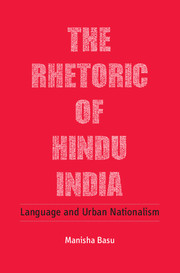Book contents
- Frontmatter
- Dedication
- Contents
- Preface
- 1 Introductory Matters: The Strange Case of Secular India
- 2 Time's Victims in a Second Republic: New Histories, New Temporalities
- 3 To Make Free and Let Die: The Economics of Metropolitan Hindutva
- 4 A Power over Life and Rebirth: V. D. Savarkar and the Essentials of Hindutva
- 5 Between Death and Redemption: Hindu India and its Antique Others
- 6 The After-Life of Indian Writing in English: Telematic Managers, Journalistic Mantras
- Bibliography
- Index
6 - The After-Life of Indian Writing in English: Telematic Managers, Journalistic Mantras
Published online by Cambridge University Press: 23 July 2017
- Frontmatter
- Dedication
- Contents
- Preface
- 1 Introductory Matters: The Strange Case of Secular India
- 2 Time's Victims in a Second Republic: New Histories, New Temporalities
- 3 To Make Free and Let Die: The Economics of Metropolitan Hindutva
- 4 A Power over Life and Rebirth: V. D. Savarkar and the Essentials of Hindutva
- 5 Between Death and Redemption: Hindu India and its Antique Others
- 6 The After-Life of Indian Writing in English: Telematic Managers, Journalistic Mantras
- Bibliography
- Index
Summary
In the previous chapter, I turned my attention from the Anglophone writings of the ideologues of Hindutva to a more recognizable form of Indian writing in English that offers a challenge, in my opinion, to the discourse of metropolitan Hindutva. In order to emphasize how such a challenge is particularly effective at the level of style, I read closely in the fifth chapter Amitav Ghosh's 1992 work In an Antique Land. In this, the final chapter of the book, I will examine how an emerging band of Anglophone Indian authors is claiming to have superseded writers of Ghosh's generation, who starting in the 1980s, are credited with having made Indian fiction in English an important commodity in the world market for postcolonial literatures. I will demonstrate, in particular, how it is precisely in the manner they distinguish themselves from an earlier generation of authors that these new Indo-Anglian scribes write themselves into the discourse of contemporary Hinduization, indeed even optimizing this discourse in its millennial version, for a digitally-enabled and globally-connected, young technocratic middle-class.
It is not uncommon to hear it being said that the Indian novel in English is not part of popular culture on the subcontinent. Scholars have contended that it has always traveled in and through the corridors of a cosmopolitan (even colonial) elitism and that it has increasingly come to represent a psychology of assimilation into metropolitan languages, their cultures and the customary protocols of their writing and circulation. Such observations are true for both phases of Indian writing in English – the first, dating roughly to the 1930s and dominated by the grand trinity of Raja Rao (1908–2006), Mulk Raj Anand (1905–2004) and R. K. Narayan (1906–2001) – and the second, beginning, if one were to be somewhat schematic about the matter, with the publication of Midnight's Children in 1981. Evidence for the elitism of the Indian English novel is close at hand. R. K. Narayan, for instance, despite being the most widely read of the first group, is still at best a short extract in textbooks meant for select Indian high schools.
- Type
- Chapter
- Information
- The Rhetoric of Hindu IndiaLanguage and Urban Nationalism, pp. 166 - 198Publisher: Cambridge University PressPrint publication year: 2016



